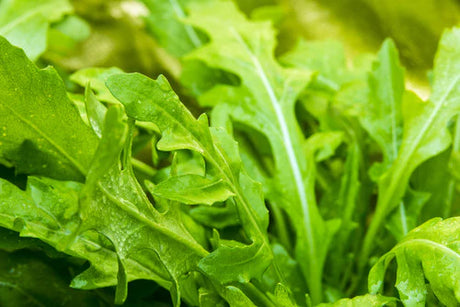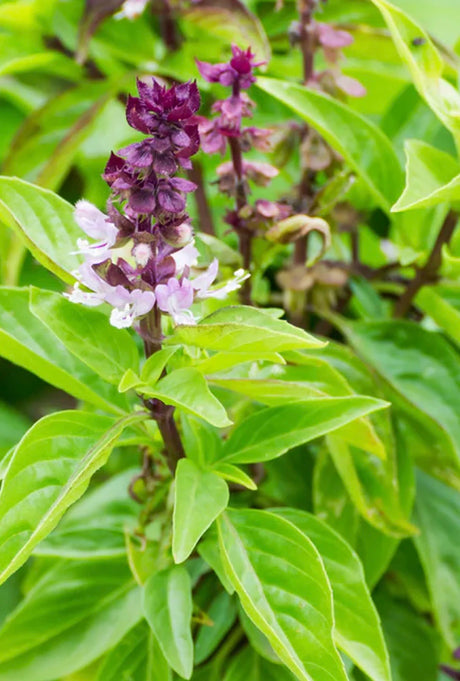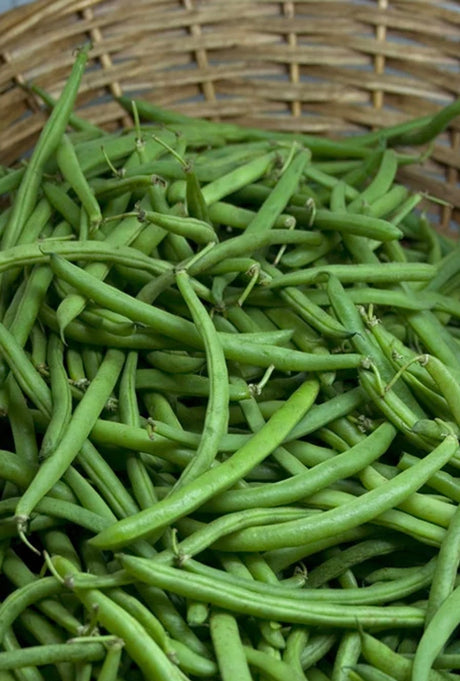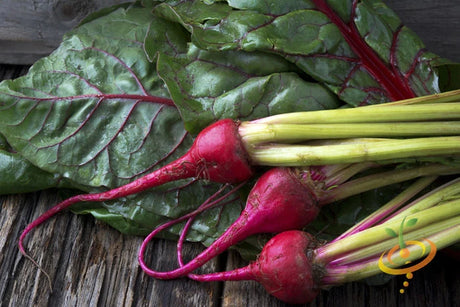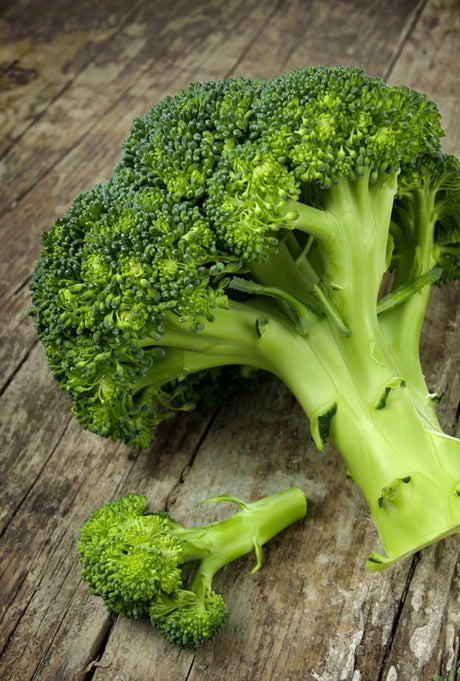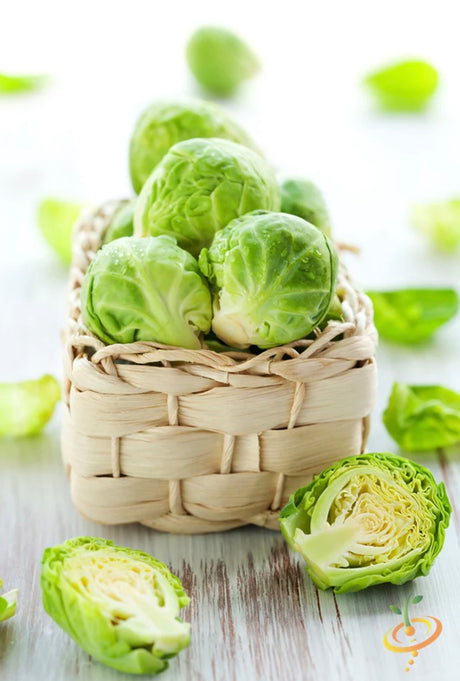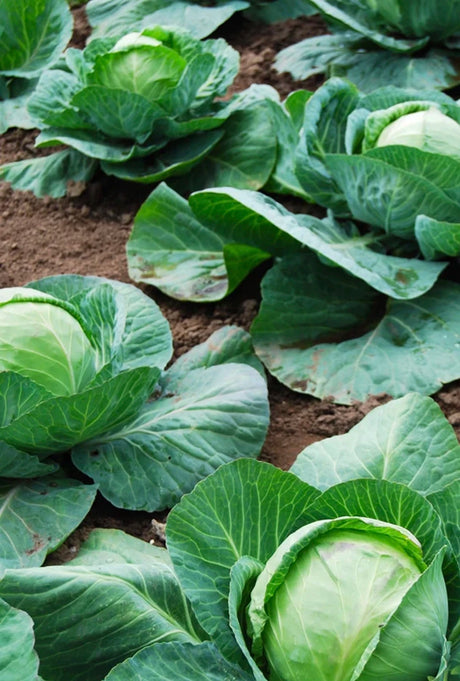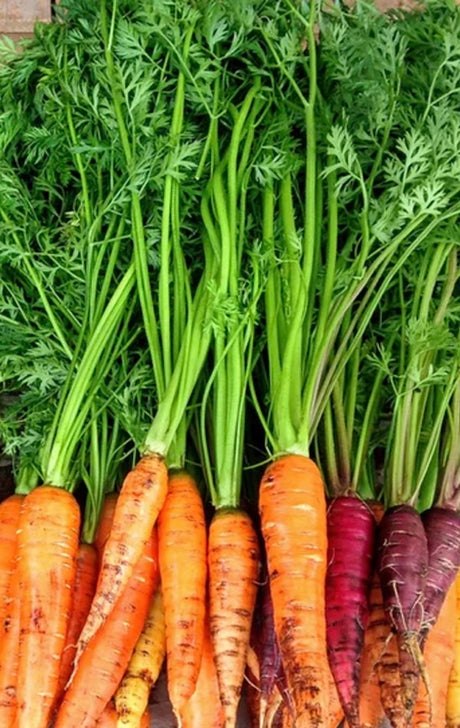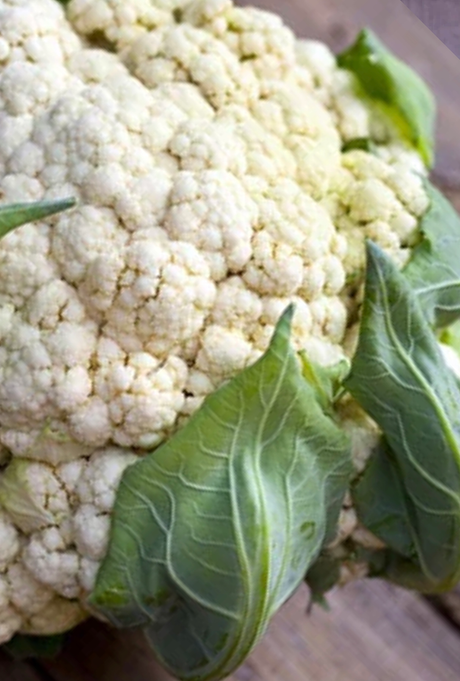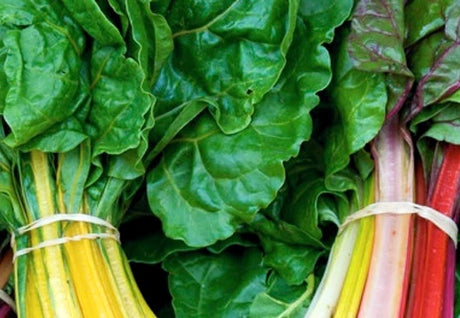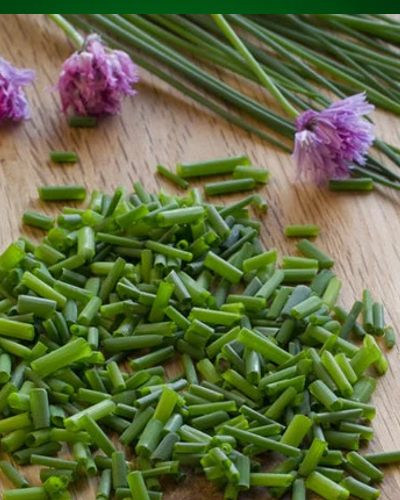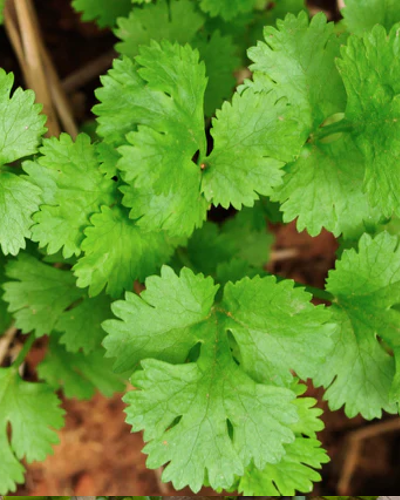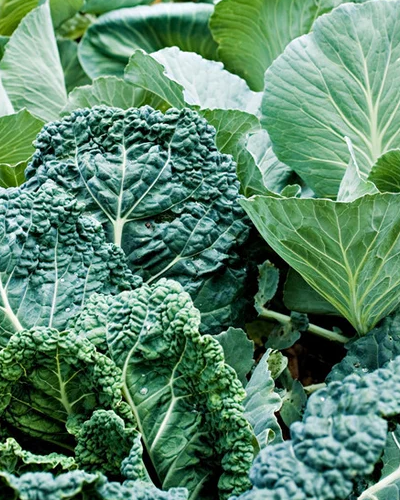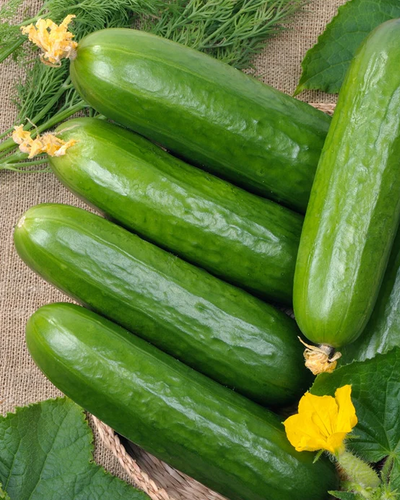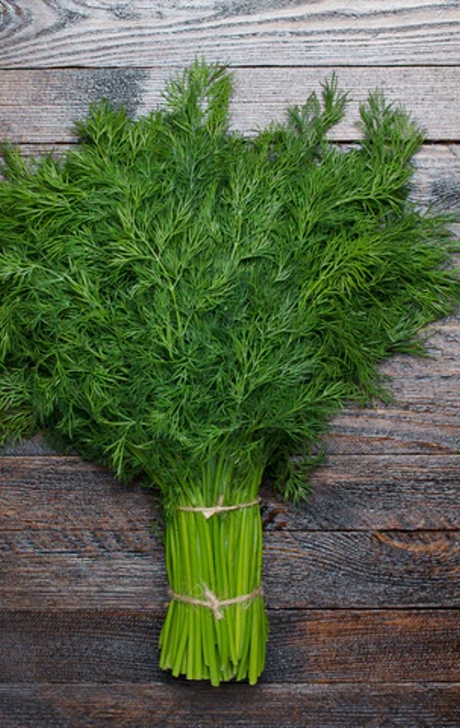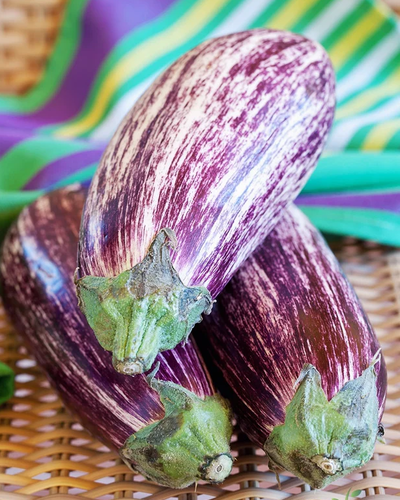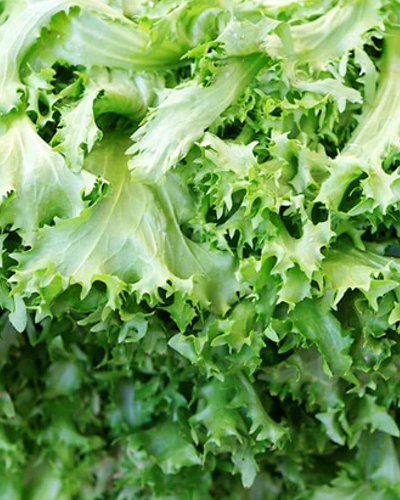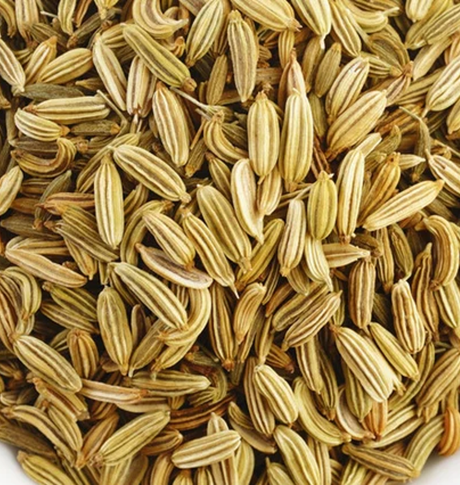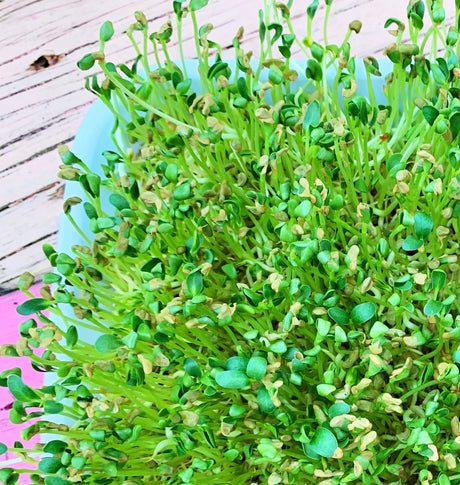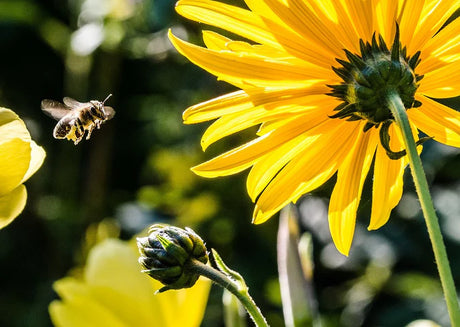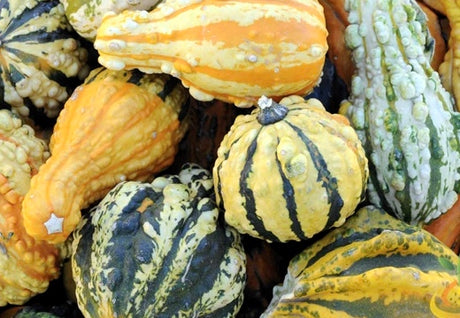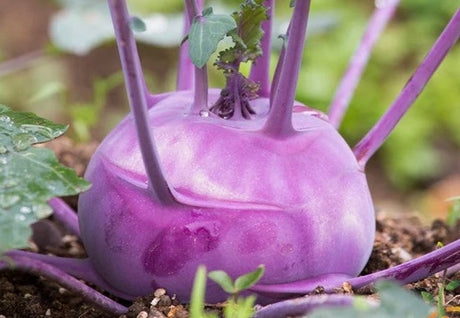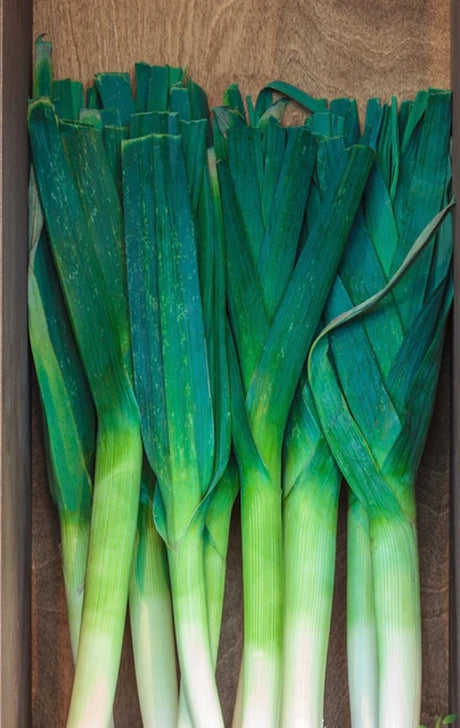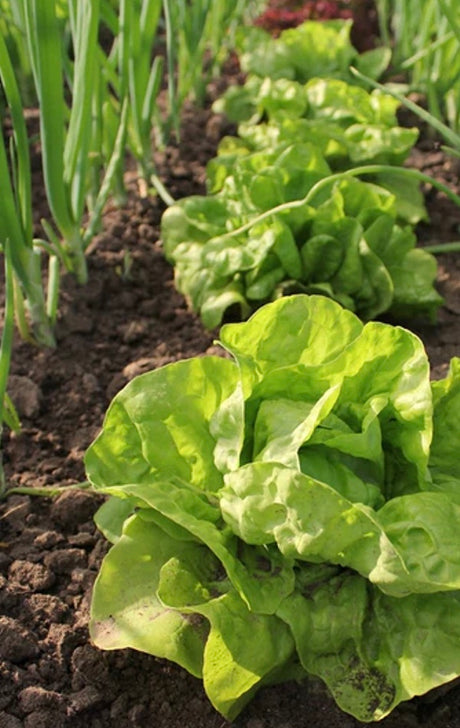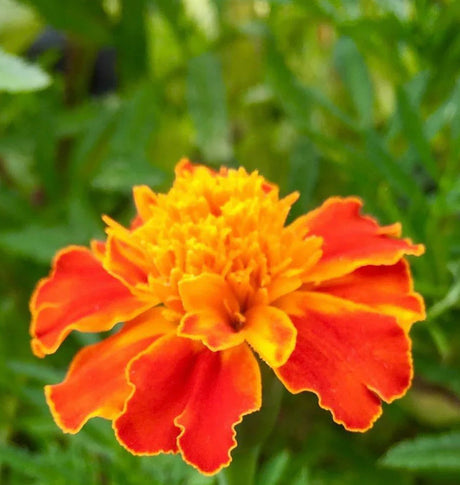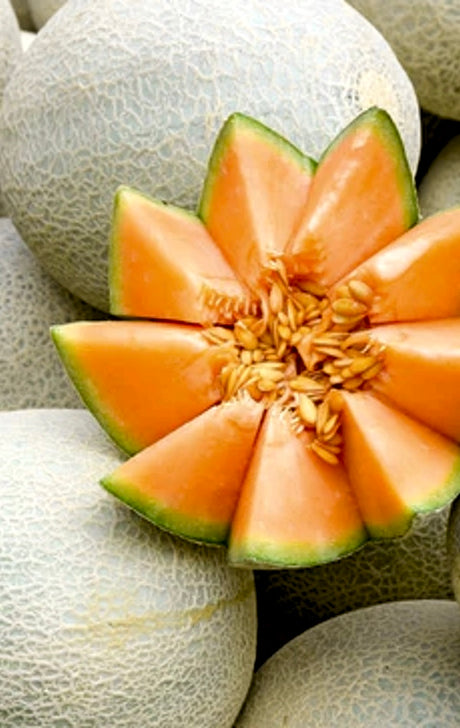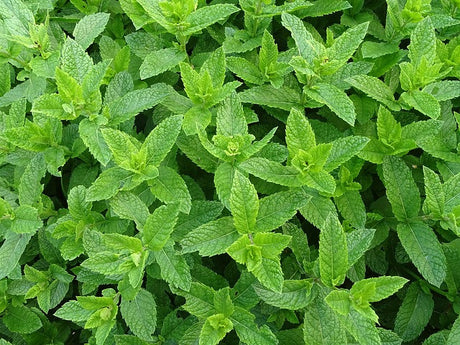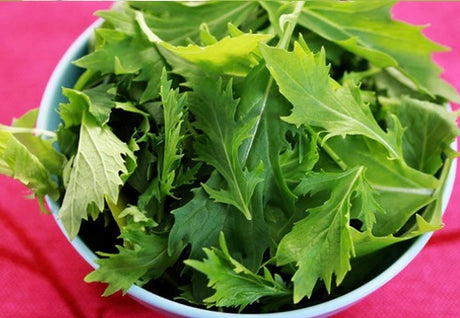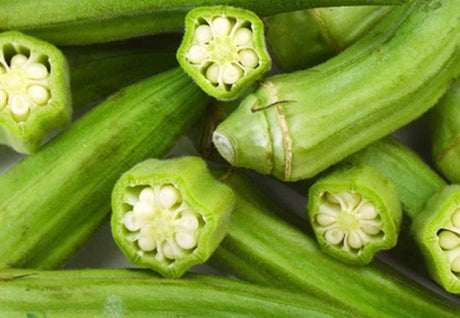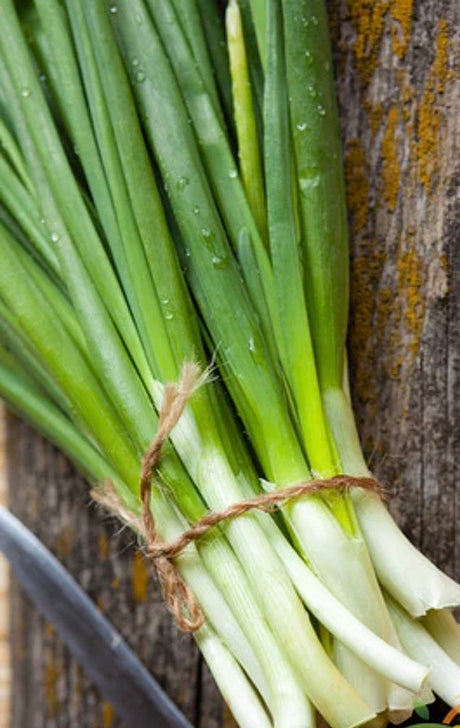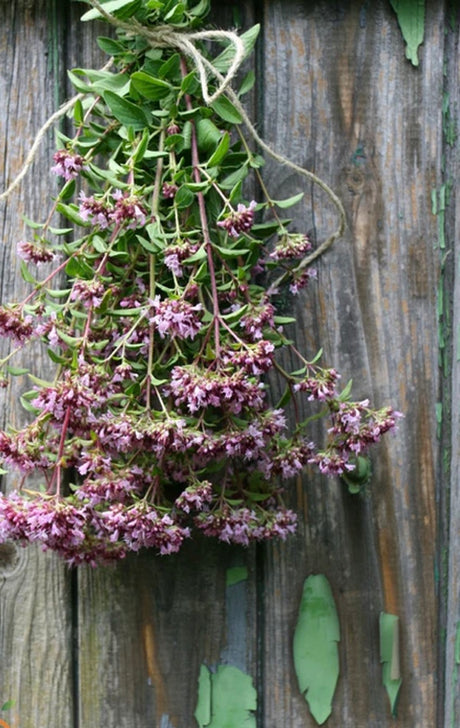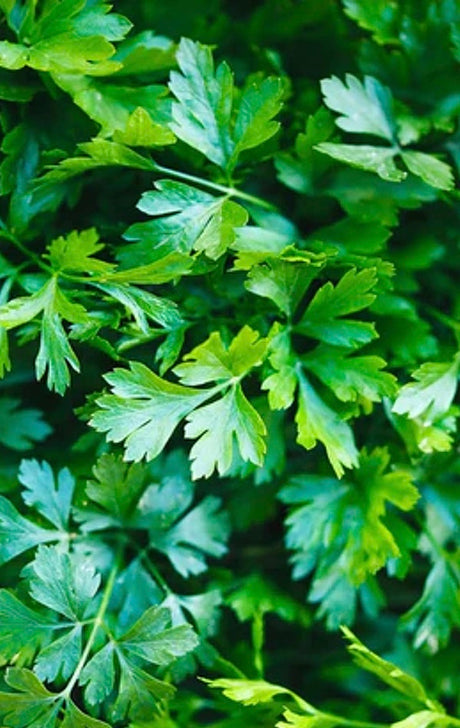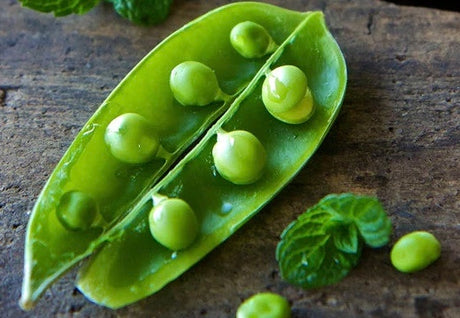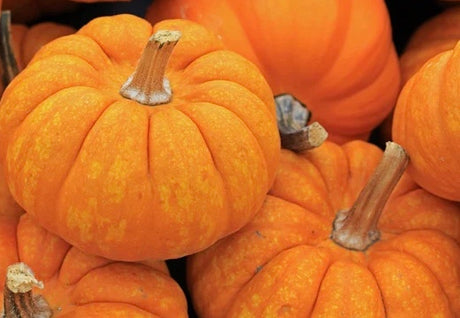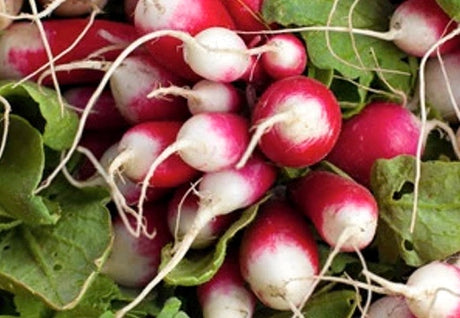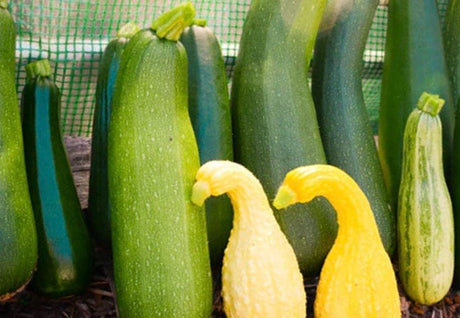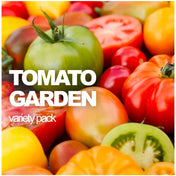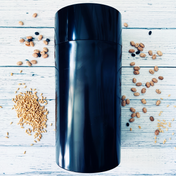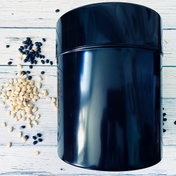Sprouts/Microgreens - Radish, Rambo (Red)
From $299 USDUnit price /UnavailableDescription
-
Organic
-
Spicy
-
Very beautiful red sprouts
- Popular amongst many culinary chefs
-
Tastes like fully grown radish. If you like the taste of radish you'll love Radish Sprouts!
Follow SeedsNow.com's board Radish on Pinterest. -
Pepper (Hot) - Ghost Chili/Bhut Jolokia 🔥🔥🔥🔥🔥🔥🥵 (HYBRID)
From $499 USDUnit price /UnavailableDescription

The Ghost Chili Pepper (Bhut Jolokia) may look like a little wrinkled whoopee cushion, but this pepper is no joke. Native to India, it’s one of the hottest peppers in the world. This 2"-3" conical fruit ripens from green to orange to red, with a sweet, fruity flavor that you’ll be able to taste for about 30-45 seconds until the heat creeps in and lights your mouth on fire. And then it gets really hot for 10-15 minutes, finally subsiding after 30-40 minutes. Take care when handling, as the thin skin tears easily. Use the pepper as you dare.
- This
- Pepper
- Is
- Supercalifragilistically hot
SEED PLANTING TIPS
- Botanical name: Capsicum chinense
- Pepper length: 2"-3"
- Scoville heat units (SHU): 800,000-1,000,000!/smear-it-on-a-fence-to repel-wild-elephants HOT!
- Plant support: Tomato cage or stake
- Depth to plant seeds: .25" deep
- Spacing between plants: 18"-24" apart
- Spacing between rows: 24"-36" apart
- Days to germinate (sprout): 7-28 days
- Germination soil temps: 75F-85F
- Soil needs: 6.0-7.0 pH
- Sun needs: Full sun
- Frost hardy: No
- Planting season: Spring, summer
- # of plants per sq. ft.: Appx. 1 plant per sq. ft.
- Days to maturity: 90-110 days
Good companion plants: Basil, Carrot, Cucumber, Eggplant, Okra, Rosemary, Sage, Squash, Tomato
- HYBRID - Open-Pollinated/Non-GMO
All Peppers ⟐ Hot Peppers 📚 Hot Peppers Grow Guide - From $299 USDUnit price /Unavailable
Description
Blueberry seeds from a certified organic blueberry farm in Kentucky, USA.
Northern and Southern blueberry seed mix.BLUEBERRY PLANTS ARE EASY TO GROW FROM SEEDS
These seeds have been stratified to get the highest possible germination rate. They are NON GMO.
Blueberry seeds are slow germinators, the first seeds will probably start to germinate in about a month, and finish germinating over the next 2-3 months. Blueberries should be started in a separate container from other varieties that germinate quickly because they can take longer to sprout up.
Squash (Winter) - Hubbard, Green
From $099 USDUnit price /UnavailableDescription
- The True Green Hubbard squash is popular 10 lb long dark bronze-green skinned squash
- Orange/Yellow flesh
- Very sweet and full of flavor - perfect for pies and canning
-
Ideal for any sized garden and easy to grow
-
Days to Maturity | 110 days
Additional Details
Though considered a vegetable in cooking, botanically speaking, squash is a fruit (being the receptacle for the plant's seeds). Squash can be served fresh (in salads) and cooked (squash stuffed with meat, fried squash, baked squash).
Squash (Winter) - Hubbard, Chicago Warted
From $199 USDUnit price /UnavailableDescription
-
The Chicago Warted Hubbard Warted squash is popular green skinned squash with orange flesh
- Very sweet and full of flavor - perfect for pies, canning, and processing.
-
Ideal for any sized garden and easy to grow.
-
Days to Maturity | 110 days
Additional DetailsThough considered a vegetable in cooking, botanically speaking, squash is a fruit (being the receptacle for the plant's seeds). Squash can be served fresh (in salads) and cooked (squash stuffed with meat, fried squash, baked squash).
-
The Chicago Warted Hubbard Warted squash is popular green skinned squash with orange flesh
- From $299 USDUnit price /Unavailable
Description
What happens when you remove the color from a pepper? The White Cloud Pepper is what happens. A lovely ivory hue, inside and out, glossy and pearly and sometimes tinged with purple. Like the clouds in the sky, they vary in shape and size from small to medium. Its bell pepper nature can’t quite be tamed, however, so the fruit turns green and then bright orange or red when it matures. The flavor endures as well. Sweet and mild with no heat and a definite crunch. Now, what happens when a gardener grows that white sweet pepper?- High yields
- Crunchy and sweet
- Harvest any color
- Good fresh and cooked
- Grows well in containers and tight spaces
SEED PLANTING TIPS
- Botanical name: Capsicum annuum
- Pepper size: Small-to-Medium/2"-5"
- Plant support: Tomato cage or stake
- Depth to plant seeds: .25" deep
- Spacing between plants: 18"-24" apart
- Spacing between rows: 24"-36" apart
- Days to germinate (sprout): 7-21 days
- Germination soil temps: 75F-85F
- Soil needs: 6.0-7.0 pH
- Sun needs: Full sun
- Frost hardy: No
- Planting season: Spring, summer
- # of plants per sq. ft.: Appx. 1 plant per 2 sq. ft.
- Days to maturity: 70-75 days
Good companion plants: Basil, Carrot, Cucumber, Eggplant, Okra, Rosemary, Sage, Squash, Tomato
All Peppers ⟐ Sweet Peppers 📚 Sweet Peppers Grow Guide Pepper (Hot) - Holiday Marbles 🔥
From $299 USDUnit price /UnavailableDescription
The Holiday Marbles Pepper is an assortment of tiny peppers with a tiny spark of heat. Compact plants cast out lots of green peppers that ripen through cream, yellow, purple, orange, and red. Shoot fresh ones onto a salad, or play for keeps and dry them whole to use like peppercorns.- High yields
- Edible ornamental
- Harvest any color
- Good for containers
SEED PLANTING TIPS
- Botanical name: Capsicum annuum
- Pepper size: 1/4"-1/2"
- Scoville heat units (SHU): 300-500/mild
- Plant support: Tomato cage or stake
- Depth to plant seeds: 1/8" deep
- Spacing between plants: 12"-18" apart
- Spacing between rows: 24"-36" apart
- Days to germinate (sprout): 7-21 days
- Germination soil temps: 75F-85F
- Soil needs: 6.0-7.0 pH
- Sun needs: Full sun
- Frost hardy: No
- Planting season: Spring, summer
- # of plants per sq. ft.: Appx. 1 plant per sq. ft.
- Days to maturity: 90+ days
Good companion plants: Basil, Carrot, Cucumber, Eggplant, Okra, Rosemary, Sage, Squash, Tomato
All Peppers ⟐ Hot Peppers 📚 Hot Peppers Grow Guide - From $199 USDUnit price /Unavailable
Description
-
The Pacific Giant pumpkin has been known to grow easily over 350 pounds!
- It's best to plant 4 to 5 seeds per hill with hills at least 8 feet apart.
-
How to Grow Super Giant MEGA Pumpkins
- Days to Maturity | 120 days
Additional Details
Looking to have the largest homegrown pumpkin of all your neighbors? Try growing the Pacific Giant, Pumpkin! They are easy to establish & produce fruit of enormous size! (think 350+ lbs.) They have a pale orange skin and a deep orange flesh. Make sure you leave plenty of room for this variety to sprawl. Vines can reach lengths up to 25 feet long. Considering the size of this variety, they are fairly quick to reach maturity at around 120 days.
-
The Pacific Giant pumpkin has been known to grow easily over 350 pounds!
Tomato - Marion (Indeterminate)
From $399 USDUnit price /UnavailableDescription
The Marion Tomato is the perfect tomato for Southern gardens—tolerant of heat and humidity, resistant to cracking and disease, producing gobs of scarlet globes that ripen mid-season, and with just enough sweetness and acidity to know you’re eating the perfect tomato. A great-tasting and versatile fruit for sauce and paste or salt and pepper.
- Heat tolerant
- Early producer
- High yields
- Good for Southern gardens
SEED PLANTING TIPS
- Botanical name: Solanum lycopersicum
- Growth type: Indeterminate, trellis support, regular pruning
- Tomato size: Medium
- Depth to plant seeds: .25" deep
- Spacing between plants: 24" apart
- Spacing between rows: 36"-48" apart
- Days to germinate (sprout): 7-14 days
- Germination soil temps: 75F-95F
- Soil needs: 6.0-6.5 pH
- Sun needs: Full sun
- Frost hardy: No
- Planting season: Spring, summer
- # of plants per sq. ft.: Appx. 1 plant per 2 sq. ft.
- Days to maturity: 75-80 days
Click here to view our full Tomato grow guide
Good companion plants: Basil, Borage, Onion, Parsley, Pepper
Tomato - Oxheart, Orange (Indeterminate)
From $299 USDUnit price /UnavailableDescription
The Orange Oxheart Tomato is what you call eye candy. High yields of deep orange heart-shaped fruits glowing against a backdrop of emerald green leaves provide a stunning visual in any garden. They’re tasty, too. Meaty, fruity, juicy slicers grow and ripen all summer long, giving you more time for more eyefuls.
You may also like: Pink Oxheart Tomatoes ⟐ Yellow Oxheart Tomatoes- Sweet and juicy
- Small seed core
- High yields
- Good fresh and cooked
SEED PLANTING TIPS
- Botanical name: Solanum lycopersicum
- Growth type: Indeterminate, trellis support, regular pruning
- Tomato size: Large (1-2 lbs.)
- Depth to plant seeds: .25" deep
- Spacing between plants: 24" apart
- Spacing between rows: 36"-48" apart
- Days to germinate (sprout): 7-14 days
- Germination soil temps: 75F-95F
- Soil needs: 6.0-6.5 pH
- Sun needs: Full sun
- Frost hardy: No
- Planting season: Spring, summer
- # of plants per sq. ft.: Appx. 1 plant per 2 sq. ft.
- Days to maturity: 75-85 days
Click here to view our full Tomato grow guide
Good companion plants: Basil, Borage, Onion, Parsley, Pepper
Tomato - Calypso (Indeterminate)
From $199 USDUnit price /UnavailableDescription
The Calypso Tomato is often referred to as a “common salad tomato". Calypso is tolerant of heat and humidity, and great for Southern gardens.
- Common tomato flavor
- Common tomato color
- Heat tolerant
- Great for Southern gardens
SEED PLANTING TIPS
- Botanical name: Solanum lycopersicum
- Growth type: Indeterminate, trellis support, regular pruning
- Tomato size: Medium
- Depth to plant seeds: .25" deep
- Spacing between plants: 24" apart
- Spacing between rows: 36"-48" apart
- Days to germinate (sprout): 7-14 days
- Germination soil temps: 75F-95F
- Soil needs: 6.0-6.5 pH
- Sun needs: Full sun
- Frost hardy: No
- Planting season: Spring, summer
- # of plants per sq. ft.: Appx. 1 plant per 2 sq. ft.
- Days to maturity: 75-80 days
Good companion plants: Basil, Borage, Onion, Parsley, Pepper
Tomato - Bradley (Indeterminate)
From $299 USDUnit price /UnavailableDescription
The Bradley Tomato is a sweet little pink tomato. By sweet, we mean lightly sweet and slightly acidic. By little, well, that’s just what you say when you describe something darling; it’s a medium-sized fruit. As for pink, it’s a dark pink. To be precise, it’s a lightly sweet and slightly acidic medium-sized dark pink tomato. A reliable producer with good-old fashioned tomato flavor.
- Well-balanced flavor
- Dark pink color
- Reliable producer
- Good fresh or cooked
SEED PLANTING TIPS
- Botanical name: Solanum lycopersicum
- Growth type: Indeterminate, trellis support, regular pruning
- Tomato size: Medium
- Depth to plant seeds: .25" deep
- Spacing between plants: 24" apart
- Spacing between rows: 36"-48" apart
- Days to germinate (sprout): 7-14 days
- Germination soil temps: 75F-95F
- Soil needs: 6.0-6.5 pH
- Sun needs: Full sun
- Frost hardy: No
- Planting season: Spring, summer
- # of plants per sq. ft.: Appx. 1 plant per 2 sq. ft.
- Days to maturity: 75-80 days
Good companion plants: Basil, Borage, Onion, Parsley, Pepper
- From $099 USDUnit price /Unavailable
Description
- The Tatsoi mustard produces dark green spoon shaped leaves
- Popular oriental green
- Excellent for hydroponic systems
- Highly resistant to cold and grows well during the winter months
-
Days to Maturity | 55 days
- Click here for complete Mustard grow guide
Additional DetailsMustard is high in Vitamin A, B, and C. Mustard greens are very popular in the southern U.S. where they are generally slow-cooked with ham hocks or other smoked-pork products. Asian cuisines generally use mustard greens pickled or stir-fried.
- The Tatsoi mustard produces dark green spoon shaped leaves
Corn Salad (Mache - Lamb's Lettuce) - French
From $299 USDUnit price /UnavailableDescription
- Valerianella locusta (aka Corn Salad) is a small annual plant that is eaten as a leaf vegetable. It has a characteristic nutty flavor, dark green color, and soft texture, and is popularly served as salad greens. //Wikipedia
- Corn Salad has a delicate flavor, similar to a butterhead lettuce. It is quite hardy and requires very little care while remaining practically free of pests & disease. Corn salad is also known for growing vigorously in almost any soil!
- We think Corn Salad tastes best right out of the garden with a light drizzle of olive oil and a squeeze of fresh lemon. Once you try this cold-hardy green, you'll be sure to make it a staple in your fall/winter gardens every year.
-
Day to Maturity | only 40 days
Corn Salad (Mache - Lamb's Lettuce) - Dutch
From $199 USDUnit price /UnavailableDescription
-
Valerianella locusta (aka Corn Salad) is a small annual plant that is eaten as a leaf vegetable. It has a characteristic nutty flavor, dark green color, and soft texture, and is popularly served as salad greens. //Wikipedia
- Corn Salad has a delicate flavor, similar to a butterhead lettuce. It is quite hardy and requires very little care while remaining practically free of pests & disease. Corn salad is also known for growing vigorously in almost any soil!
- We think Corn Salad tastes best right out of the garden with a light drizzle of olive oil and a squeeze of fresh lemon. Once you try this cold-hardy green, you'll be sure to make it a staple in your fall/winter gardens every year.
-
Day to Maturity | only 40 days
-
Valerianella locusta (aka Corn Salad) is a small annual plant that is eaten as a leaf vegetable. It has a characteristic nutty flavor, dark green color, and soft texture, and is popularly served as salad greens. //Wikipedia
- From $199 USDUnit price /Unavailable
Description
-
The Nutri-Red carrot is a brilliant red color with a tinge of orange .
- 9" long slim tapered ends.
- Excellent for stews and many culinary creations.
- Tender and very sweet with a strong carrot flavor.
- Carrots are a sun-loving plants that also like the cold.
- Just keep them consistently watered and they'll be happy.
-
Day to Maturity | 75 days
- Carrot Seeds | Carrots are an annual cool-season crop, half-hardy to frost and light freezes. Sow seeds evenly in a very shallow furrow, about 1/4 inch deep, and keep seeds moist so they will germinate.
Click here for complete Carrot grow guide
Additional DetailsCarrot gets its characteristic and bright orange colour from β-carotene, which is metabolised into vitamin A in humans when bile salts are present in the intestines. Carrots are also rich in dietary fibre, antioxidants, and minerals.
Follow SeedsNow.com's board Carrots on Pinterest. -
The Nutri-Red carrot is a brilliant red color with a tinge of orange .
- From $299 USDUnit price /Unavailable
Description
-
These seeds produces a medium-to-large hard round heads of cabbage
- Suitable for spring, summer, and fall crops
- Cold hardy
- Stores well. Suitable for home gardens and market growers
- Perfect for Kraut recipes
-
Days to Maturity | 90 days
-
Cabbage Seeds | ❄️ Cabbage is an annual cool-season crop, hardy to frost and light freezes. A smaller cabbage head has better flavor and can stay in the field longer without splitting. To keep them small, plant close together or, when the head is almost full, give the plant a sharp twist to break up the roots. 😀 Cabbage is a wide spreading foliage plant with handsome leaves that form a tight, hard ball head on a strong central stem. Young plants may bolt if grown at 50F for a long time; however mature plants of late varieties improve flavor in cold weather.
Click here for complete Cabbage grow guide
Additional Details
Did you know? Cabbage is an excellent source of vitamin C! It also contains significant amounts of glutamine, an amino acid that has anti-inflammatory properties. Cabbage can also be included in dieting programs, as it is a low calorie food.
-
These seeds produces a medium-to-large hard round heads of cabbage
- From $299 USDUnit price /Unavailable
Description
- The Jubilee is a very long shaped watermelon
- Deep red flesh
- Grows up to appx. 40 lbs
-
Days to Maturity | 90 days
-
Watermelons are heat-loving plants that need lots of sun. They grow on a long vine, so make sure to give them plenty of space to roam around.
Follow SeedsNow.com's board Watermelon on Pinterest. - The Jubilee is a very long shaped watermelon
- From $299 USDUnit price /Unavailable
Description
- Cal Sweet is one of the sweetest tasting and most popular watermelon varieties available
- A commercial grower favorite - sells well at farmers markets
- Dark green stripes on the exterior with bright red flesh
- Grows to appx. 35 lbs
- Perfect-sized watermelon for any-sized backyard
-
Days to Maturity | 90 days
-
Watermelons are heat-loving plants that need lots of sun. They grow on a long vine, so make sure to give them plenty of space to roam around.
Follow SeedsNow.com's board Watermelon on Pinterest. - Cal Sweet is one of the sweetest tasting and most popular watermelon varieties available
- From $299 USDUnit price /Unavailable
Description
- Mini pumpkins about the size of a grapefruit
- Tiny pumpkins weigh about 14 ounces
- Days to Maturity | 90 days
Additional DetailsThe word pumpkin originates from the word pepon, which is Greek for “large melon". The French adapted this word to pompon, which the British changed to pumpion and later American colonists changed that to the word we use today, "pumpkin".
- Mini pumpkins about the size of a grapefruit
Sprouts/Microgreens - Sunflower
From $199 USDUnit price /UnavailableDescription
Baby sunflower micro-greens are delicious! If you've never tried sprouting sunflowers they make a great addition to salads. They are extremely rich in essential nutrients.
Wildflowers - Moist Area Scatter Garden Seed Mix
From $499 USDUnit price /UnavailableDescription
 Includes a mix of 16 different beautiful flower varieties. Cover moist spaces with moist soi tolerant wildflowers! Mix includes annuals and perennials. Easy to grow and require little maintenance.
Includes a mix of 16 different beautiful flower varieties. Cover moist spaces with moist soi tolerant wildflowers! Mix includes annuals and perennials. Easy to grow and require little maintenance.
Wildflower establishment requires some important steps:- Site selection/preparation: It's important to address competition from weeds: pull, till, or use organic herbicides. If planting in the spring/summer you can wait for weeds to germinate, control and then plant the wildflower seeds.
- Seeding: You will want to have good seed to soil contact, broadcasting by hand is a good approach on small plot, may want to mix with an inert carrier, sand or other. Raking in and covering with soil 2-3 times seed thickness.
- Watering: During establishment for the first month, can be from rain in spring or supplement with irrigation.
- Timing: The best time to plant is in spring to early summer and even again in late fall.This mix includes the following:
GENUS/SPECIES
COMMON NAME
TYPE
HEIGHT
COLOR

Aquilegia vulgaris
Dwarf European Columbine
P
10 to 18
Red/Violet/Blue

Centaurea cyanus
Bachelor's Button
A
12 to 36
Blue or Mix

Cheiranthus allionii
Siberian Wallflower
B/P
10 to 18
Orange

Chrysanthemum maximum
Daisy Chrysanthemum
B/P
16 to 24
White

Clarkia elegans
Clarkia Mix
A
18 to 30
Pink/Lavender

Coreopsis lanceolata
Lance Leaf Coreopsis
P
18 to 36
Yellow

Coreopsis tinctoria
Plains Coreopsis
A
12 to 36
Yellow-Maroon

Collinsia heterophylla
Chinese Houses
A
12 to 24
White-Violet

Delphinium consolida
Rocket Larkspur
A
12 to 36
White/Pink/Blue/Violet

Dianthus barbatus
Sweet William
P
12 to 24
White/Pink/Red

Digitalis purpurea
Common Foxglove
B/P
24 to 48
Purple/Cream

Gypsophila elegans
Annual Baby's Breath
A
8 to 18
White

Lavatera trimestris
Rose Mallow
A
24 to 48
White/Pink

Nemophila menziesii
Baby Blue Eyes
A
4 to 12
Blue

Papaver rhoeas
Shirley Poppy
A
12 to 30
White/Pink/Red

Viola cornuta
Helen Mount
A/P
4 to 12
Purple/Yellow/Blue
A- Annual
69%
P- Perennial
16%
B- Biennial
15%
Wildflowers - Dryland Scatter Garden Seed Mix
From $499 USDUnit price /UnavailableDescription
 Includes a mix of 21 different beautiful flower varieties. Cover dry spaces with drought tolerant wildflowers! Mix includes annuals and perennials. Easy to grow and require little maintenance
Includes a mix of 21 different beautiful flower varieties. Cover dry spaces with drought tolerant wildflowers! Mix includes annuals and perennials. Easy to grow and require little maintenance
Wildflower establishment requires some important steps:- Site selection/preparation: It's important to address competition from weeds: pull, till, or use organic herbicides. If planting in the spring/summer you can wait for weeds to germinate, control and then plant the wildflower seeds.
- Seeding: You will want to have good seed to soil contact, broadcasting by hand is a good approach on small plot, may want to mix with an inert carrier, sand or other. Raking in and covering with soil 2-3 times seed thickness.
- Watering: During establishment for the first month, can be from rain in spring or supplement with irrigation.
- Timing: The best time to plant is in spring to early summer and even again in late fall.This mix includes the following:
Genus/Species
Common Name
HEIGHT
TYPE
COLOR

Centaurea cyanus
Cornflower
36"
A
Blue

Cheiranthus allionii
Siberian Wallflower
18"
B
Orange

Chrysanthemum maximum
Shasta Daisy
36"
P
White
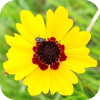
Coreopsis tinctoria
Plains Coreopsis
36"
A
Yellow/Red

Dianthus barbatus
Sweet William
24"
B
Mix

Dimorphotheca auranantiaca
African Daisy
12"
A
Yellow

Echinacea purpurea
Purple Coneflower
36"
P
Purple

Eschscholtzia californica
California Poppy
12"
A
Orange

Gaillardia aristata
Perennial Gaillardia
24"
P
Yellow/Red

Gaillardia pulchella
Annual Gaillardia
24"
A
Yellow/Red

Gypsophila elegans
Annual Baby's Breath
24"
A
White

Linaria maroccana
Spurred Snapdragon
24"
A
Mix

Linum lewisii
Blue Flax
24"
P
Blue

Lobularia maritima
Sweet Alyssum
10"
A
White

Oenothera lamarckiana
Evening Primrose
36"
B
Yellow

Papaver rhoeas
Corn Poppy
24"
A
Red

Penstemon strictus
Rocky Mtn. Penstemon
36"
P
Blue

Ratibida columnifera
Prairie Coneflower
24"
P
Red

Rudbeckia hirta
Black Eyed Susan
36"
A/B/P
Gold

Rudbeckia hirta
Gloriosa Daisy
36"
A/B/P
Yellow/Red

Silene armeria
Catchfly
18"
A
Pink
ANNUAL
64%
BI-ANNUAL
11%
PERENNIAL
25%
Wildflowers - Low Grow Scatter Garden Seed Mix
From $499 USDUnit price /UnavailableDescription
 Includes a mix of 17 different beautiful flower varieties. A mostly annual flower seed mix that blooms quickly and stays below knee high. Great for containers and edges.
Includes a mix of 17 different beautiful flower varieties. A mostly annual flower seed mix that blooms quickly and stays below knee high. Great for containers and edges.
Wildflower establishment requires some important steps:- Site selection/preparation: It's important to address competition from weeds: pull, till, or use organic herbicides. If planting in the spring/summer you can wait for weeds to germinate, control and then plant the wildflower seeds.
- Seeding: You will want to have good seed to soil contact, broadcasting by hand is a good approach on small plot, may want to mix with an inert carrier, sand or other. Raking in and covering with soil 2-3 times seed thickness.
- Watering: During establishment for the first month, can be from rain in spring or supplement with irrigation.
- Timing: The best time to plant is in spring to early summer and even again in late fall.This mix includes the following:
GENUS/SPECIES
COMMON NAME
TYPE
HEIGHT
COLOR

Centaurea cyanus
Bachelor Button dwf.
A
12 to 36
Blue or Mix

Cheiranthus allionii
Siberian Wallflower
B/P
10 to 18
Orange

Clarkia amoena
Farewell to Spring dwf.
A
8 to 14
Pink/White

Collinsia heterophyla
Chinese Houses
A
12 to 24
White-Violet

Coreopsis lanceolata
Lance Leaf Coreopsis dwf.
P
18 to 36
Yellow

Coreopsis tinctoria
Plains Coreopsis dwf.
A
12 to 36
Yellow-Maroon

Cynoglossum firmament
Chinese Forget Me Not
A/B
18 to 24
Blue

Dianthus barbatus
Sweet William
P
12 to 24
White/Pink/Red

Dimorphotheca aurantiaca
African Daisy
A
8 to 16
Orange/Salmon/White

Eschscholtzia californica
California Poppy
TP
12 to 18
Yellow/Orange

Gypsophila elegans
Baby's Breath
A
8 to 18
White

Iberis umbellata
Candytuft
A
12 to 18
White/Pink/Violet

Linum lewisii
Blue Flax
P
18 to 30
Blue

Lobularia maritima
Sweet Alyssum
TP
8 to 16
White

Nemophila menziesii
Baby Blue Eyes
A
4 to 12
Blue

Phacelia campanularia
California Bluebells
A
8 to 20
Blue

Silene armeria
Catchfly
A/B
16 to 22
Pink
A=ANNUAL
59%
P=PERENNIAL
14%
TP= TENDER PERENNIALS
13%
B=BIANNUAL
14%
Wildflowers - Partial Shade Scatter Garden Seed Mix
From $499 USDUnit price /UnavailableDescription
 Plant this mix in an area of your garden that gets partial shade. Includes a mix of 15 different shade tolerant (less than 6 hours of sunlight per day) flower varieties.
Plant this mix in an area of your garden that gets partial shade. Includes a mix of 15 different shade tolerant (less than 6 hours of sunlight per day) flower varieties.
Wildflower establishment requires some important steps:- Site selection/preparation: It's important to address competition from weeds: pull, till, or use organic herbicides. If planting in the spring/summer you can wait for weeds to germinate, control and then plant the wildflower seeds.
- Seeding: You will want to have good seed to soil contact, broadcasting by hand is a good approach on small plot, may want to mix with an inert carrier, sand or other. Raking in and covering with soil 2-3 times seed thickness.
- Watering: During establishment for the first month, can be from rain in spring or supplement with irrigation.
- Timing: The best time to plant is in spring to early summer and even again in late fall.This mix includes the following:
GENUS/SPECIES
COMMON NAME
TYPE
HEIGHT

Aquilegia vulgaris
Garden Columbine
P
10-18"

Centaurea cyanus
Bachelor's Button
A
12-36"
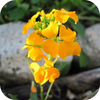
Cheiranthus allionii
Siberian Wallflower
B/P
10-18"
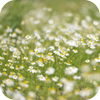
Chrysanthemum maximum
Daisy Chrysanthemum
P
16-24"

Clarkia elegans
Clarkia Mix
A
18-30"

Coreopsis lanceolata
Lance Leaf Coreopsis
P
18-36"

Coreopsis tinctoria
Plains Coreopsis
A
12-36"
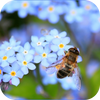
Cynoglossum amabile
Chinese Forget-Me-Not
A/B
18-24"
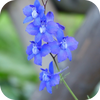
Delphinium consolida
Rocket Larkspur
A
12-36"

Dianthus barbatus
Sweet William
P
12-24"

Digitalis purpurea
Common Foxglove
B/P
24-48"

Gypsophila elegans
Annual Baby's Breath
A
8-18"

Lavatera trimestris
Rose Mallow
A
24-48"

Nemophila menziesii
Baby Blue Eyes
A
4-12"

Papaver rhoeas
Shirley Poppy
A
12-30"
A-Annual
59%
P-Perennial
15%
B-Biennial
26%
Sprouts/Microgreens - Bean, Garbanzo (Chickpea)
From $199 USDUnit price /UnavailableDescription
Classic garbanzos (chickpea) for sprouts and hummus. Learn how to make your own hummus >
- From $299 USDUnit price /Unavailable
Description
- Sparky Marigold flowers are bright, bold, and beautiful
- Colors range from orange, red, and yellow
- Grows only 12" - 14" tall
- Most popular for attracting butterflies, bees, and other beneficial pollinators
- Sparky is easy to grow and will grow all summer
- Great for cut flowers and floral arrangements
- Sparky Marigold flowers are bright, bold, and beautiful
Swiss Chard - Barese "Baby Leaf" Dark Green
From $299 USDUnit price /UnavailableDescription
- The Barese Swiss Chard variety produces delicious tender 10" tall dark glossy green leaves with curled edges
- A delicious baby leaf that grows quickly
- Ready to harvest in less than 30 days. Plant produces good yields of 10" tall leaves
- Excellent for salads and/or steamed with others greens
- Days to Maturity | Less than 30 days!
Additional DetailsSwiss chard is high in vitamins A, K and C, with a 175g serving containing 214%, 716%, and 53%, respectively, of the recommended daily value. It is also rich in minerals, dietary fiber and protein.
- The Barese Swiss Chard variety produces delicious tender 10" tall dark glossy green leaves with curled edges
- From $399 USDUnit price /Unavailable
Description

Roman Chamomile, also called English Chamomile, has been cultivated as a medicinal herb since Medieval times. This hardy, aromatic, mat-forming groundcover perennial in the daisy family produces small white flowers with large yellow solid cone centers and aromatic, fern-like foliage. Easily spreads through both reseeding and creeping roots, and can become invasive. Use it to fill in space between stones or pavers, or create a fragrant, low-maintenance “chamomile lawn” like the royals do at Buckingham Palace. Both the apple-scented flowers and stems are used fresh or dried, and steeped into a calming herbal tea sipped before beddy-bye time.
Apple fragrance
Grows 3"-6" tall
Can be invasive
Good for containersAs a companion plant, it attracts pollinators and beneficial insects; repels cabbage moths, cabbage white fly, cabbage worms, cucumber beetles, and mosquitoes; and is said to increase the fragrance and flavor of aromatic herbs such as basil, mint, oregano, rosemary, sage, and thyme.
German Chamomile has many of the same uses as Roman Chamomile, but it’s a tall, bushy annual with more, but smaller flowers. You can determine which type of Chamomile you have if you cut open the yellow center of the flower. German has hollow centers while Roman has solid ones.
As a medicinal herb, Chamomile has been used internally to treat allergies, anxiety, arthritis, asthma, colds, colic, cough, flatulence, gum disease, headache, indigestion, inflammation, insomnia, irritable bowel syndrome (IBS), menstrual cramps, morning sickness, stress, nervousness, restlessness, and stomach upset, and externally to treat burns, earache, hemorrhoids, mouth sores, skin problems, sunburns, teething pain, tired eyes, toothache, and wounds.
⚠️ Medicinal properties are presented as information only, and are not a recommendation or prescription for use. Consult a medical professional before using any herb medicinally.
SEED PLANTING TIPS
- Botanical name: Chamaemelum nobile
- Life cycle: Herbaceous perennial
- Hardiness zones: 4-9
- Planting season: Spring, summer, fall
- Days to maturity: 60-65 days
- Depth to plant seeds: Lightly cover - seeds need light to germinate
- Days to germinate (sprout): 7-14 days
- Germination soil temps: 55F-70F
- Spacing between plants: 6"-9" apart
- Spacing between rows: 18"-24" apart
- # of plants per sq. ft.: Appx. 4 plants per sq. ft.
- Soil types: Sandy, loamy, silty, chalky, shallow, poor, rich, moist, well-drained
- Soil pH: 5.5-7.5
- Sun needs: Full sun, part shade
- Water needs: Low - do not overwater
- Cold stratify: No
- Frost tolerant: Yes
- Heat tolerant: No
- Drought tolerant: Yes
- Deer resistant: Yes
- Culinary use: No
- Medicinal use: Yes
Good companion plants: Basil, Bean, Broccoli, Brussels Sprouts, Cabbage, Carrot, Cauliflower, Chives, Collards, Cucumber, Fava Bean, Garlic, Hyssop, Kale, Lavender, Marigold, Mint, Mustard, Onion, Oregano, Pepper, Parsley, Rosemary, Soybean, Sage, Thyme, Squash, Tomato, Zucchini
More facts about Chamomile:
-
Chamomile helps combat headaches, toothaches, and earaches.
- Sometimes known as "the plant doctor", because it is thought to help the growth and health of many other plants, especially ones that produce essential oils.
-
Thought to increase production of those oils, making certain herbs, like mints (spearmint, sage, oregano) and basil stronger in scent and flavor.
- Can be taken as a herbal tea, two teaspoons of dried flower per cup of tea, which should be steeped for ten to fifteen minutes while covered to avoid evaporation of the volatile oils.
See Chamomile Recipes & Growing Tips on our Pinterest Board
Follow SeedsNow.com's board Chamomile on Pinterest. Shungiku, Edible Chrysanthemum
From $399 USDUnit price /UnavailableDescription
- Shungiku, Edible Chrysanthemum is a very versatile asian green
- Known as Shungiku, Edible Chrysanthemum, Garland Chrysanthemum, Chop Suey Greens and many other names
- This is a salad green that can be grown in winter and again in spring
- The flowers of Shungiku can be dried and stored to be used for tea. Often considered a substitute for Chamomile - with its soothing and stomach quieting properties
-
Days to Maturity | 30 - 50 days
- Shungiku, Edible Chrysanthemum is a very versatile asian green
Wildflowers - All Perennial Scatter Garden Seed Mix
From $499 USDUnit price /UnavailableDescription
 Includes a mix of 16 popular perennial flower varieties and colors. Scatter this mix of seeds in your garden and enjoy a beautiful assortment of flowers for multiple years.
Includes a mix of 16 popular perennial flower varieties and colors. Scatter this mix of seeds in your garden and enjoy a beautiful assortment of flowers for multiple years.A perennial plant or simply perennial is a plant that lives for more than two years. The term is often used to differentiate a plant from shorter-lived annuals and biennials. Wikipedia
Wildflower establishment requires some important steps:- Site selection/preparation: It's important to address competition from weeds: pull, till, or use organic herbicides. If planting in the spring/summer you can wait for weeds to germinate, control and then plant the wildflower seeds.
- Seeding: You will want to have good seed to soil contact, broadcasting by hand is a good approach on small plot, may want to mix with an inert carrier, sand or other. Raking in and covering with soil 2-3 times seed thickness.
- Watering: During establishment for the first month, can be from rain in spring or supplement with irrigation.
- Timing: The best time to plant is in spring to early summer and even again in late fall.
This mix includes all of the following seed varieties:GENUS/SPECIES
COMMON NAME
HEIGHT
COLOR

Achillea millefolium
White Yarrow
24-36"
W

Aquilegia vulgaris
Columbine
10-18"
R/V/B

Aster novae angliae
New England Aster
24-36"
B/P/W/P

Cheiranthus allionii
Siberian Wallflower
10-18"
O

Chrysanthemum maximum
Shasta Daisy
16-24"
W

Coreopsis lanceolata Dwarf
Lance-Leaf Coreopsis
18-36"
Y

Dianthus barbatus
Sweet William
12-24"
W/P/R

Echinacea purpurea
Purple Coneflower
24-36"
P

Gaillardia aristata
Blanketflower
18-30"
Y/R

Liatris spicata
Gayfeather
24-48"
P

Linum lewisii
Blue Flax
18-30"
B

Lupinus perennis
Lupine
12-36"
B

Oenothera missouriensis
Dwarf Evening Primrose
8-12"
Y

Ratibida columnifera
Mexican Hat
12-36"
R/Y

Ratibida columnifera
Prairie Coneflower
12-36"
Y

Rudbeckia hirta
Black Eyed Susan
18-30"
Y
W-White
R-Red
V-Violet
B-Blue
Y-Yellow
O-Orange
P-Purple
Wildflowers - Bee Scatter Garden Seed Mix
From $499 USDUnit price /UnavailableDescription
Plant this mix to attract bees and other beneficial pollinators. =)

Wildflower establishment requires some important steps:- Site selection/preparation: It's important to address competition from weeds: pull, till, or use organic herbicides. If planting in the spring/summer you can wait for weeds to germinate, control and then plant the wildflower seeds.
- Seeding: You will want to have good seed to soil contact, broadcasting by hand is a good approach on small plot, may want to mix with an inert carrier, sand or other. Raking in and covering with soil 2-3 times seed thickness.
- Watering: During establishment for the first month, can be from rain in spring or supplement with irrigation.
- Timing: The best time to plant is in spring to early summer and even again in late fall.Wildflowers - Exotic Mountain Scatter Garden Seed Mix
From $499 USDUnit price /UnavailableDescription
 Includes a mix of 17 of the most vibrant and beautiful flower varieties you've ever seen. Scatter this mix in your garden. Specifically for elevations above 7,000 feet in western continental U.S.Wildflower establishment requires some important steps:- Site selection/preparation: It's important to address competition from weeds: pull, till, or use organic herbicides. If planting in the spring/summer you can wait for weeds to germinate, control and then plant the wildflower seeds.
Includes a mix of 17 of the most vibrant and beautiful flower varieties you've ever seen. Scatter this mix in your garden. Specifically for elevations above 7,000 feet in western continental U.S.Wildflower establishment requires some important steps:- Site selection/preparation: It's important to address competition from weeds: pull, till, or use organic herbicides. If planting in the spring/summer you can wait for weeds to germinate, control and then plant the wildflower seeds.
- Seeding: You will want to have good seed to soil contact, broadcasting by hand is a good approach on small plot, may want to mix with an inert carrier, sand or other. Raking in and covering with soil 2-3 times seed thickness.
- Watering: During establishment for the first month, can be from rain in spring or supplement with irrigation.
- Timing: The best time to plant is in spring to early summer and even again in late fall.
This mix includes all of the following seed varieties:GENUS/SPECIES
COMMON NAME
HEIGHT
TYPE
COLOR
Aquilegia caerulea
Columbine
24"-36"
P
Y, R, V, B

Centaurea cyanus
Cornflower
12"-36"
A
B or mix

Cheiranthus allionii
Siberian Wallflower
16"-24"
B/P
O

Chrysanthemum maximum
Shasta Daisy
16"-24"
P
W

Coreopsis tinctoria
Plains Coreopsis
12"-36"
A
Y, M

Dianthus barbatus
Sweet William
12"-24"
P
W,P,R

Dimorphotheca aurantiaca
African Daisy
8"-16"
A
O,S,W

Eschscholtzia californica
California Poppy
12"-18"
A
Y,O

Gaillardia aristata
Perennial Gaillardia
18"-30"
PA
Y,R

Gypsophila elegans
Annual Baby's Breath
8"-18"
P
W

Linum lewisii
Blue Flax
18"-30"
B/P
B

Lobularia maritima
Sweet Alyssum
8"-16"
P
W

Oenothera lamarckiana
Evening Primrose
24"-60"
B/P
Y

Penstemon strictus
Rocky Mtn. Penstemon
24"-36"
P
B

Ratibida columnifera
Prairie Coneflower
12"-36"
B/P
R,Y

Rudbeckia hirta
Black Eyed Susan
12"-36"
A/B/P
Y

Silene armeria
Catchfly
16"-22"
A
P
A-Annual
52%
Y- YELLOW
P-Perennial
24%
R-Red
B-Biennal
24%
V-Violet
B-Blue
W-White
M-Maroon
O-Orange
P-Purple
S-Salmon
Wildflowers - Forever Pink Scatter Garden Seed Mix
From $499 USDUnit price /UnavailableDescription
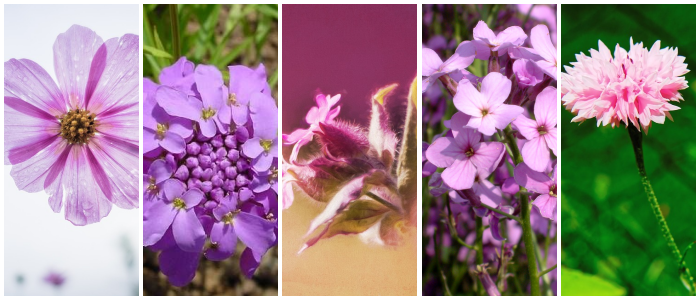 Includes a mix of 9 of the most vibrant and beautiful pink flower varieties. Scatter this mix in your garden and enjoy a beautiful assortment of pink flowers!Wildflower establishment requires some important steps:- Site selection/preparation: It's important to address competition from weeds: pull, till, or use organic herbicides. If planting in the spring/summer you can wait for weeds to germinate, control and then plant the wildflower seeds.
Includes a mix of 9 of the most vibrant and beautiful pink flower varieties. Scatter this mix in your garden and enjoy a beautiful assortment of pink flowers!Wildflower establishment requires some important steps:- Site selection/preparation: It's important to address competition from weeds: pull, till, or use organic herbicides. If planting in the spring/summer you can wait for weeds to germinate, control and then plant the wildflower seeds.
- Seeding: You will want to have good seed to soil contact, broadcasting by hand is a good approach on small plot, may want to mix with an inert carrier, sand or other. Raking in and covering with soil 2-3 times seed thickness.
- Watering: During establishment for the first month, can be from rain in spring or supplement with irrigation.
- Timing: The best time to plant is in spring to early summer and even again in late fall.
This mix includes all of the following seed varieties:GENUS/SPECIES
COMMON NAME

Centaurea cyanus
Cornflower Tall Pink

Clarkia amoena
Godetia Semi Dwf Mix

Cosmos bippinatus
Pinkie Dwarf

Hesperis matronalis
Purple Dame's Rocket

Iberis umbellata
Dwf. Candytuft Fairy Bqt.

Lavatera trimestris
Tree Mallow

Monarda citriodora
Lemon Mint

Silene armeria
Catchfly

Silene pendula
Nodding Catchfly
Wildflowers - Poppy Scatter Garden Seed Mix
From $499 USDUnit price /UnavailableDescription

Includes a mix of 6 of the most vibrant and beautiful Poppy flower varieties. Scatter this mix in your garden and enjoy a beautiful assortment of Poppy flowers!
Wildflower establishment requires some important steps:- Site selection/preparation: It's important to address competition from weeds: pull, till, or use organic herbicides. If planting in the spring/summer you can wait for weeds to germinate, control and then plant the wildflower seeds.
- Seeding: You will want to have good seed to soil contact, broadcasting by hand is a good approach on small plot, may want to mix with an inert carrier, sand or other. Raking in and covering with soil 2-3 times seed thickness.
- Watering: During establishment for the first month, can be from rain in spring or supplement with irrigation.
- Timing: The best time to plant is in spring to early summer and even again in late fall.
This mix includes all of the following seed varieties:GENUS/SPECIES
COMMON NAME

Eschscholzia californica
California Poppy Orange
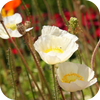
Eschscholzia californica
California Poppy White

Eschscholzia californica
Mikado

Eschscholzia californica
Mission Bells

Papaver rhoeas
Red Corn Poppy

Papaver rhoeas
Shirley Mix Poppy
Wildflowers - Righteous Red Scatter Garden Seed Mix
From $499 USDUnit price /UnavailableDescription

Includes a mix of 10 of the most vibrant and beautiful red colored flower varieties. Scatter this mix in your garden and enjoy a beautiful assortment of red flowers!
Wildflower establishment requires some important steps:- Site selection/preparation: It's important to address competition from weeds: pull, till, or use organic herbicides. If planting in the spring/summer you can wait for weeds to germinate, control and then plant the wildflower seeds.
- Seeding: You will want to have good seed to soil contact, broadcasting by hand is a good approach on small plot, may want to mix with an inert carrier, sand or other. Raking in and covering with soil 2-3 times seed thickness.
- Watering: During establishment for the first month, can be from rain in spring or supplement with irrigation.
- Timing: The best time to plant is in spring to early summer and even again in late fall.
This mix includes all of the following seed varieties:GENUS/SPECIES
COMMON NAME

Centaurea cyanus
Cornflower Tall Red

Eschscholzia californica
Mikado

Linum rubrum
Scarlet Flax

Lychinis chalcedonica
Maltese Cross

Papaver rhoeas
Red Corn Poppy

Papaver rhoeas
Shirley Single Mix

Phlox drummondii
Annual Red

Tagetes erecta
French Marigold

Trifolium incarnatum
Crimson Clover

Zinnia elegens
Zinnia Red
Wildflowers - California Native Scatter Garden Seed Mix
From $499 USDUnit price /UnavailableDescription
 Includes a mix of 24 popular Native California Wildflower varieties. Scatter this mix in your garden and enjoy a beautiful assortment of Native California Wildflowers.Wildflower establishment requires some important steps:- Site selection/preparation: It's important to address competition from weeds: pull, till, or use organic herbicides. If planting in the spring/summer you can wait for weeds to germinate, control and then plant the wildflower seeds.
Includes a mix of 24 popular Native California Wildflower varieties. Scatter this mix in your garden and enjoy a beautiful assortment of Native California Wildflowers.Wildflower establishment requires some important steps:- Site selection/preparation: It's important to address competition from weeds: pull, till, or use organic herbicides. If planting in the spring/summer you can wait for weeds to germinate, control and then plant the wildflower seeds.
- Seeding: You will want to have good seed to soil contact, broadcasting by hand is a good approach on small plot, may want to mix with an inert carrier, sand or other. Raking in and covering with soil 2-3 times seed thickness.
- Watering: During establishment for the first month, can be from rain in spring or supplement with irrigation.
- Timing: The best time to plant is in spring to early summer and even again in late fall.
This mix includes all of the following seed varieties:GENUS/SPECIES
COMMON NAME
TYPE
COLOR
Height

Achillea millefolium
White Yarrow
P
White
12 to 36

Alyssum maritimum
Sweet Alyssum
A
White
8 to 16

Centaurea cyanus
Cornflower
A
Blue
12 to 36

Cheiranthus allionii
Siberian Wallflower
B
Orange
10 to 18

Chyrsanthemum coronarium
Garland Daisy
A
White/Yellow
36 to 48

Chrysanthemum maximum
Shasta Daisy
P
White
16 to 24

Clarkia amoena
Farewell To Spring
A
Pink/White
8 to 14

Clarkia elegans
Clarkia
A
Pink/White
18 to 30

Coreopsis lanceolata
Lance-Leaf Coreopsis
P
Yellow
18 to 36

Coreopsis tinctoria
Plains Coreopsis
A
Yellow
12 to 36

Cynoglossum firmament
Chinese Forget Me Not
A
Blue
18 to 24

Delphinuim consolida
Larkspur
A
Mix
12 to 36

Eschscholtzia californica
California Poppy
A
Orange
12 to 18

Gypsophila elegans
Annual Baby's Breath
A
White
8 to 18

Linaria maroccana
Spurred Snapdragon
A
Mix
12 to 24

Linum lewisii
Blue Flax
P
Blue
18 to 30
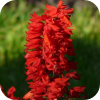
Linum grandiflorum rubrum
Scarlet Flax
A
Scarlet
12 to 36

Lupinus perennis
Perennial Lupine
P
Blue
12 to 36

Nemophila menziesii
Baby Blue Eyes
A
Blue
4 to 12

Oenothera lamarckiana
Evening Primrose
B
Yellow
24 to 36

Papaver rhoeas
Corn Poppy
A
Red/Pink
12 to 30

Phacelia campanularia
California Bluebell
A
Blue
8 to 20

Rudbeckia hirta
Black Eyed Susan
B
Gold
12 to 36

Silene armeria
Catchfly
A
Purple
16 to 22
A = ANNUL 74%
B = BIENNIAL 8%
P = PERENNIAL 18%
Cabbage - Early Jersey Wakefield
From $299 USDUnit price /UnavailableDescription
- These seeds produces good yields of 2 lb heads of cabbage in the shape of a cone.
- Excellent flavor and very sweet.
- Open pollinated heirloom variety.
-
Days to Maturity | 65-75 days
-
Cabbage Seeds | ❄️ Cabbage is an annual cool-season crop, hardy to frost and light freezes. A smaller cabbage head has better flavor and can stay in the field longer without splitting. To keep them small, plant close together or, when the head is almost full, give the plant a sharp twist to break up the roots. 😀 Cabbage is a wide spreading foliage plant with handsome leaves that form a tight, hard ball head on a strong central stem. Young plants may bolt if grown at 50F for a long time; however mature plants of late varieties improve flavor in cold weather.
Click here for complete Cabbage grow guide
Did you know? Cabbage is an excellent source of vitamin C! It also contains significant amounts of glutamine, an amino acid that has anti-inflammatory properties. Cabbage can also be included in dieting programs, as it is a low calorie food.
- These seeds produces good yields of 2 lb heads of cabbage in the shape of a cone.
- From $299 USDUnit price /Unavailable
Description
- Annual plant
- Adds great flavor and color to many culinary creations
- 3 ft. plant with strongly aromatic foliage, stems, and heads
- Excellent for fresh pickling
-
Days to Maturity | 40 - 65 days
Additional Details
Dill has a very long history of herbal use going back more than 2,000 years. The seeds are a common and very effective household remedy for a wide range of digestive problems. An infusion is especially efficacious in treating gripe in babies and flatulence in young children. The seed is aromatic, carminative, mildly diuretic, galactogogue, stimulant and stomachic.
Other Medicinal Properties
Dill is also used in the form of an extracted essential oil. Used either in an infusion, or by eating the seed whole, the essential oil in the seed relieves intestinal spasms and griping, helping to settle colic. Chewing the seed improves bad breath. Dill is also a useful addition to cough, cold and flu remedies, it can be used with antispasmodics such as Viburnum opulus to relieve period pains. Dill will also help to increase the flow of milk in nursing mothers and will then be taken by the baby in the milk to help prevent colic.
See Dill Recipes & Growing Tips on our Pinterest Board
Follow SeedsNow.com's board Dill on Pinterest. Milkweed, Tropical (Silky Deep Red/Blood Flower) Flowers
From $299 USDUnit price /UnavailableDescription
Silky Deep Red Tropical Milkweed (Asclepias curassavica), also called Blood Flower, is striking in the garden and is a vital host plant for the endangered monarch butterfly. This easy care bushy perennial reseeds easily, isn’t fussy about soil or water, and can grow just about anywhere. Puts out bright, showy 2"-4" flower clusters in brilliant red-orange with yellow centers on slender stems that grow 2'-3' tall. Blooms continuously summer through fall, providing migrating monarchs with nectar snacks for their long journey and a place to lay their eggs. Can be grown as an annual in cooler grow zones. Lovely and long-lasting in cut flower arrangements.
- Life cycle: Herbaceous perennial
- Bloom season: Summer, fall
- Attracts: Beneficial insects, hummingbirds, bees, butterflies, and other pollinators
- Flower meaning: Dignity, freedom, rejection, remembrance, solitude
As a medicinal plant, Milkweed has been used internally to treat diarrhea, gonorrhea, intestinal parasites and worms, pneumonia, spleen inflammation, and stomach tumors, and externally to treat bleeding, boils, corns, dermatitis, eye infections, ringworm, skin parasites, snakebites, sores, warts, and wounds.
⚠️ Although Milkweed is known to be safe when used correctly, all parts of the plant are toxic and may even cause death to people, pets, horses, and livestock if ingested in large quantities. The milky sap is a skin irritant. Do not ingest while pregnant or nursing.
⚠️ Medicinal properties are presented as information only, and are not a recommendation or prescription for use. Consult a medical professional before using any plant medicinally.
NOTE: A parasite, Ophryocystis elektroscirrha (OE), travels with monarchs and is deposited on every plant they visit. In warm grow zones where this non-native milkweed does not die back from a killing frost, the OE parasite can build up and harm the caterpillars that feed on the leaves and the butterflies they become. A continuously blooming milkweed may also encourage the monarchs to dally rather than migrate, which interrupts their reproductive cycle. It’s easy to eliminate both dangers, by cutting your plants to the ground at least once per season.
SEED PLANTING TIPS
- Botanical name: Asclepias curassavica
- Hardiness zones: 8-11
- Planting season: Spring, fall
- Days to maturity: 100-120 days
- Cold stratify: No
- Depth to plant seeds: 1/4" deep - Soaking seeds in warm water overnight aids germination.
- Spacing between plants: 1'-2' apart
- Days to germinate (sprout): 10-21 days
- Germination soil temps: 60F-70F
- Soil types: Clay, caliche, sandy, loamy, silty, rocky, chalky, rich, dry, moist, wet
- Soil pH: 6.1-7.5
- Water needs: Average
- Sun needs: Full sun, part shade
- Frost tolerant: No
- Drought tolerant: Yes
- Deer resistant: Yes
More facts about Milkweed:
- The beautiful monarch butterflies rely on milkweed to lay their eggs upon. Sadly, habitats that naturally support monarchs are becoming fewer in number each year. New urban development & chemically treated "big agriculture" are destroying habitats of milkweed all over the United States.
- Sow in early January for first year blooms.
Tomato - San Marzano (Indeterminate)
From $299 USDUnit price /UnavailableDescription
Can a tomato be a celebrity? Ask the San Marzano Tomato—if you can get past its bodyguards. One commercial grower proclaims it the “gold standard for taste.” Martha Stewart devoted an entire blog post to it. Certified tomatoes from Italy are regulated. It even has its own Wikipedia page. But at the end of the day, it’s still just a tomato. One that’s longer and thinner than other plum/paste tomatoes, with exceptional tomato flavor, meaty and thin skinned for slicing, few seeds and fleshy for saucing, and very high yields. We’ve joined the fan club. How about you?
- Sweet, intense flavor
- Very high yields
- Compact plant
- Good fresh or cooked
SEED PLANTING TIPS
- Botanical name: Solanum lycopersicum
- Growth type: Indeterminate, trellis support, regular pruning
- Tomato size: Medium
- Depth to plant seeds: .25" deep
- Spacing between plants: 24" apart
- Spacing between rows: 36"-48" apart
- Days to germinate (sprout): 7-14 days
- Germination soil temps: 75F-95F
- Soil needs: 6.0-6.5 pH
- Sun needs: Full sun
- Frost hardy: No
- Planting season: Spring, summer
- # of plants per sq. ft.: Appx. 1 plant per 2 sq. ft.
- Days to maturity: 75-90 days
Click here to view our full Tomato grow guide
Good companion plants: Basil, Borage, Onion, Parsley, Pepper
Wildflowers - All Annual Scatter Garden Seed Mix
From $499 USDUnit price /UnavailableDescription
 Includes a mix of 21 popular annual flower varieties and colors. Scatter this mix of seeds in your garden and enjoy a beautiful assortment of flowers all year.Wildflower establishment requires some important steps:- Site selection/preparation: It's important to address competition from weeds: pull, till, or use organic herbicides. If planting in the spring/summer you can wait for weeds to germinate, control and then plant the wildflower seeds.
Includes a mix of 21 popular annual flower varieties and colors. Scatter this mix of seeds in your garden and enjoy a beautiful assortment of flowers all year.Wildflower establishment requires some important steps:- Site selection/preparation: It's important to address competition from weeds: pull, till, or use organic herbicides. If planting in the spring/summer you can wait for weeds to germinate, control and then plant the wildflower seeds.
- Seeding: You will want to have good seed to soil contact, broadcasting by hand is a good approach on small plot, may want to mix with an inert carrier, sand or other. Raking in and covering with soil 2-3 times seed thickness.
- Watering: During establishment for the first month, can be from rain in spring or supplement with irrigation.
- Timing: The best time to plant is in spring to early summer and even again in late fall.
This mix includes all of the following seed varieties:GENUS/SPECIES
COMMON NAME
TYPE
HEIGHT
COLOR

Calendula officinalis
Calendula
A
12 to 24
Yello/Orange/Cream

Centaurea cyanus
Bachelor Button
A
12 to 36
Blue or Mix

Cheiranthus allionii
Siberian Wallflower
B/P
10 to 18
Orange

Coreopsis tinctoria
Plains Coreopsis
A
12 to 36
Yellow-Maroon

Cosmos bipinnatus
Cosmos
A
36 to 60
White/Pink/Crimson/Rose

Delphinium ajacis
Rocket Larkspur
A
12 to 36
White/Pink/Blue/Violet

Dimorphotheca aurantiaca
African Daisy
A
8 to 16
Orange/Salmon/White

Eschscholtzia californica
California Poppy
TP
12 to 18
Yellow/Orange

Gaillardia pulchella
Indian Blanket
A
12 to 24
Yellow-Red
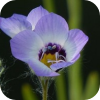
Gilia tricolor
Bird's Eyes
A
12 to 18
Lavender-White

Gypsophila elegans
Baby's Breath
A
8 to 18
White

Iberis umbellata
Candytuft
A
12 to 18
White/Pink/Violet

Linaria maroccana
Spurred Snapdragon N. Lights
A
12 to 124
Pink/Yellow/Violet

Linum grandiflorum rubrum
Scarlet Flax
A
12 to 36
Scarlet

Lobularia maritima
Sweet Alyssum
TP
8 to 16
White

Lupinus hartwegii
Lupine
A
12 to 24
Mix

Oenothera lamarckiana
Evening Primrose
B/P
24 to 60
Yellow

Papaver rhoeas
Corn Poppy
A
12 to 30
White/Pink/Red

Phacelia campanularia
California Bluebells
A
8 to 20
Blue

Rudbeckia hirta
Black Eyed Susan
A/B/P
12 to 36
Yellow

Silene armeria
Catchfly
A/B
16 to 22
Pink
Wildflowers - Fragrant Flower Scatter Garden Seed Mix
From $499 USDUnit price /UnavailableDescription
 Includes a mix of 18 popular fragrant flower varieties and colors. Scatter this mix of seeds in your garden and enjoy the most fragrant flower assortment you've ever smelt.Wildflower establishment requires some important steps:- Site selection/preparation: It's important to address competition from weeds: pull, till, or use organic herbicides. If planting in the spring/summer you can wait for weeds to germinate, control and then plant the wildflower seeds.
Includes a mix of 18 popular fragrant flower varieties and colors. Scatter this mix of seeds in your garden and enjoy the most fragrant flower assortment you've ever smelt.Wildflower establishment requires some important steps:- Site selection/preparation: It's important to address competition from weeds: pull, till, or use organic herbicides. If planting in the spring/summer you can wait for weeds to germinate, control and then plant the wildflower seeds.
- Seeding: You will want to have good seed to soil contact, broadcasting by hand is a good approach on small plot, may want to mix with an inert carrier, sand or other. Raking in and covering with soil 2-3 times seed thickness.
- Watering: During establishment for the first month, can be from rain in spring or supplement with irrigation.
- Timing: The best time to plant is in spring to early summer and even again in late fall.
This mix includes all of the following seed varieties:GENUS/SPECIES
COMMON NAME

Centaurea cyanus
Cornflower

Cheiranthus allionii
Siberian Wallflower

Cynoglossum amabile
Chinese Forget Me Not

Dianthus barbatus
Sweet William
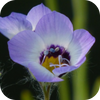
Gilia tricolor
Bird's Eyes

Iberis umbelleta
Candytuft

Lathyrus odoratus
Sweet Pea

Lavender Vera
Lavender

Lobularia maritima
Sweet Alyssum

Matthiola bicornis
Evening Scented Stock

Mirabilis jalapa
Four O' Clock

Monarda punctata
Spotted Bee Balm
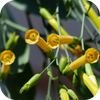
Nicotiana affinis
Tabacco mix
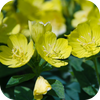
Oenothera lamarkiana
Evening Primrose

Reseda ordorata
Mignonette

Tagetes patula
Marigold Sparky

Tropaeulum majus
Nasturtium

Viola cornuta
Helen Mount
Wildflowers - Beneficial Insect Garden Seed Mix
From $499 USDUnit price /UnavailableDescription
 Plant this mix to attract beneficial insects such as ladybugs, lacewings, ground beetles and other insects that feed on pests.
Plant this mix to attract beneficial insects such as ladybugs, lacewings, ground beetles and other insects that feed on pests.
Wildflower establishment requires some important steps:- Site selection/preparation: It's important to address competition from weeds: pull, till, or use organic herbicides. If planting in the spring/summer you can wait for weeds to germinate, control and then plant the wildflower seeds.
- Seeding: You will want to have good seed to soil contact, broadcasting by hand is a good approach on small plot, may want to mix with an inert carrier, sand or other. Raking in and covering with soil 2-3 times seed thickness.
- Watering: During establishment for the first month, can be from rain in spring or supplement with irrigation.
- Timing: The best time to plant is in spring to early summer and even again in late fall.
This mix includes all of the following seed varieties:GENUS/SPECIES
COMMON NAME
TYPE
HEIGHT
COLOR

Achillea millefolium
White Yarrow
P
12 to 36
White

Gypsophila elegans
Baby's Breath
A
8 to 18
White

Iberis umbellata
Candytuft
A
12 to 18
White/Pink/Violet

Layia platyglossa
Tidy Tips
A
6 to 12
Yellow-White

Lobularia maritima
Alyssum
TP
8 to 16
White

Nemophila menziesii
Baby Blue Eyes
A
4 to 12
Blue

Phacelia campanularia
California Bluebells
A
8 to 20
Blue

Trifolium repens
White Dutch Clover
P
4 to 10
White
Annual
50%
Perennial
50%
Wildflowers - Coneflower Scatter Garden Seed Mix
From $499 USDUnit price /UnavailableDescription
 Includes a mixture of 6 popular coneflower varieties. Scatter this mix in your garden and enjoy a beautiful assortment of coneflowers!
Includes a mixture of 6 popular coneflower varieties. Scatter this mix in your garden and enjoy a beautiful assortment of coneflowers!Wildflower establishment requires some important steps:
- Site selection/preparation: It's important to address competition from weeds: pull, till, or use organic herbicides. If planting in the spring/summer you can wait for weeds to germinate, control and then plant the wildflower seeds.
- Seeding: You will want to have good seed to soil contact, broadcasting by hand is a good approach on small plot, may want to mix with an inert carrier, sand or other. Raking in and covering with soil 2-3 times seed thickness.
- Watering: During establishment for the first month, can be from rain in spring or supplement with irrigation.
- Timing: The best time to plant is in spring to early summer and even again in late fall.
This mix includes all of the following seed varieties:GENUS/SPECIES
COMMON NAME

Echinacea purpurea
Purple Coneflower

Echinacea palladia
Pale Purple Coneflower

Rudbeckia amplexicaulis
Clasping Coneflower

Ratibida columnifera
Red Mexican Hat

Ratibida columnifera
Yellow Prairie Coneflower

Ratibida pinnata
Greyheaded Coneflower
Wildflowers - Cosmos Flower Scatter Garden Seed Mix
From $499 USDUnit price /UnavailableDescription
Includes a mix of 7 popular cosmos flower varieties. Scatter this mix in your garden and enjoy a beautiful assortment of cosmos flowers!
Wildflower establishment requires some important steps:
- Site selection/preparation: It's important to address competition from weeds: pull, till, or use organic herbicides. If planting in the spring/summer you can wait for weeds to germinate, control and then plant the wildflower seeds.
- Seeding: You will want to have good seed to soil contact, broadcasting by hand is a good approach on small plot, may want to mix with an inert carrier, sand or other. Raking in and covering with soil 2-3 times seed thickness.
- Watering: During establishment for the first month, can be from rain in spring or supplement with irrigation.
- Timing: The best time to plant is in spring to early summer and even again in late fall.
This mix includes all of the following seed varieties:GENUS/SPECIES
COMMON NAME
Cosmos bippinatus
Cosmos, Sensation Mix
Cosmos bippinatus
Dazzler
Cosmos bippinatus
Gloria
Cosmos bippinatus
Picotee
Cosmos bippinatus
Pinkie
Cosmos bippinatus
Purity
Cosmos sulphureus
Sulphur Cosmos
Wildflowers - Lupine Scatter Garden Seed Mix
From $499 USDUnit price /UnavailableDescription
 Includes a mix of 5 popular lupine flower varieties and colors. Scatter this mix of seeds in your garden and enjoy a beautiful assortment of lupine flowers.Wildflower establishment requires some important steps:- Site selection/preparation: It's important to address competition from weeds: pull, till, or use organic herbicides. If planting in the spring/summer you can wait for weeds to germinate, control and then plant the wildflower seeds.
Includes a mix of 5 popular lupine flower varieties and colors. Scatter this mix of seeds in your garden and enjoy a beautiful assortment of lupine flowers.Wildflower establishment requires some important steps:- Site selection/preparation: It's important to address competition from weeds: pull, till, or use organic herbicides. If planting in the spring/summer you can wait for weeds to germinate, control and then plant the wildflower seeds.
- Seeding: You will want to have good seed to soil contact, broadcasting by hand is a good approach on small plot, may want to mix with an inert carrier, sand or other. Raking in and covering with soil 2-3 times seed thickness.
- Watering: During establishment for the first month, can be from rain in spring or supplement with irrigation.
- Timing: The best time to plant is in spring to early summer and even again in late fall.
This mix includes all of the following seed varieties:GENUS/SPECIES
COMMON NAME
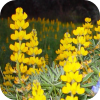
Lupinus densiflora
Golden Yellow

Lupinus hartwegii
Dwarf Pixie Delight

Lupinus perennis
Perennial Lupine

Lupinus polyphyllus
Russel Lupine

Lupinus succulentis
Arroyo Lupine
continue shopping
YOU MAY ALSO LIKE
View all-
$29999 USDUnit price /Unavailable
-
All-in-One Heritage Tomato Garden Variety Pack
$3999 USD$4499Unit price /Unavailable -
All-in-One Mosquito Repellent Garden Variety Pack
$3999 USDUnit price /Unavailable -
All-in-One Medicinal Herb Garden Seed Bank
$9999 USDUnit price /Unavailable -
All-in-One Pepper Garden Variety Pack
$3999 USDUnit price /Unavailable -
All-in-One Chicken Garden Variety Pack
$3999 USDUnit price /Unavailable -
All-in-One Lettuce & Leafy Greens Variety Pack
$3999 USDUnit price /Unavailable -
All-in-One Culinary Herb Garden Variety Pack
$3999 USDUnit price /Unavailable -
All-in-One Homestead Seed Bank
$9999 USDUnit price /Unavailable -
All-in-One Medicinal Herb Garden Variety Pack
$4999 USDUnit price /Unavailable -
All-in-One Root Crop Garden Variety Pack
$3999 USDUnit price /Unavailable -
All-in-One Fall/Winter Variety Pack
$3999 USDUnit price /Unavailable -
All-in-One Sprouts/Microgreens Variety Pack
$3499 USDUnit price /Unavailable -
All-in-One Hydroponic Greens Variety Pack
$3999 USDUnit price /Unavailable -
All-in-One Fall/Winter Seed Bank
$8999 USDUnit price /Unavailable -
All-in-One Sprouts/Microgreens Seed Bank w/Sprouting Jar
$6999 USD$7999Unit price /Unavailable -
All-in-One Culinary Herb Garden Seed Bank
$8999 USDUnit price /Unavailable -
All-in-One Spring/Summer Seed Bank
$8999 USDUnit price /Unavailable -
All-in-One Urban Garden Variety Pack
$3999 USDUnit price /Unavailable -
All-in-One Cucumber Garden Variety Pack
$2999 USDUnit price /Unavailable -
*NEW!* Wildflower Scatter Garden Variety Pack
$3999 USDUnit price /Unavailable -
All-in-One SAVE THE BEES! Garden Variety Pack
$3999 USDUnit price /Unavailable -
All-in-One Salsa Garden Variety Pack
$3999 USDUnit price /Unavailable -
All-in-One Tower Garden Variety Pack
$3999 USDUnit price /Unavailable
FEATURED COLLECTIONS
View allcontinue shopping





















































 Plant this mix in an area of your garden that gets partial shade. Includes a mix of 15 different shade tolerant (less than 6 hours of sunlight per day) flower varieties.
Plant this mix in an area of your garden that gets partial shade. Includes a mix of 15 different shade tolerant (less than 6 hours of sunlight per day) flower varieties. 


































 Includes a mix of 9 of the most vibrant and beautiful pink flower varieties. Scatter this mix in your garden and enjoy a beautiful assortment of pink flowers
Includes a mix of 9 of the most vibrant and beautiful pink flower varieties. Scatter this mix in your garden and enjoy a beautiful assortment of pink flowers































 Includes a mix of 21 popular annual flower varieties and colors. Scatter this mix of seeds in your garden and enjoy a beautiful assortment of flowers all year.
Includes a mix of 21 popular annual flower varieties and colors. Scatter this mix of seeds in your garden and enjoy a beautiful assortment of flowers all year.






















 Includes a mix of 18 popular fragrant flower varieties and colors. Scatter this mix of seeds in your garden and enjoy the most fragrant flower assortment you've ever smelt.
Includes a mix of 18 popular fragrant flower varieties and colors. Scatter this mix of seeds in your garden and enjoy the most fragrant flower assortment you've ever smelt.



















 Plant this mix to attract beneficial insects such as ladybugs, lacewings, ground beetles and other insects that feed on pests.
Plant this mix to attract beneficial insects such as ladybugs, lacewings, ground beetles and other insects that feed on pests. 









 Includes a mixture of 6 popular coneflower varieties. Scatter this mix in your garden and enjoy a beautiful assortment of coneflowers!
Includes a mixture of 6 popular coneflower varieties. Scatter this mix in your garden and enjoy a beautiful assortment of coneflowers!









 Includes a mix of 5 popular lupine flower varieties and colors. Scatter this mix of seeds in your garden and enjoy a beautiful assortment of lupine flowers.
Includes a mix of 5 popular lupine flower varieties and colors. Scatter this mix of seeds in your garden and enjoy a beautiful assortment of lupine flowers.






























